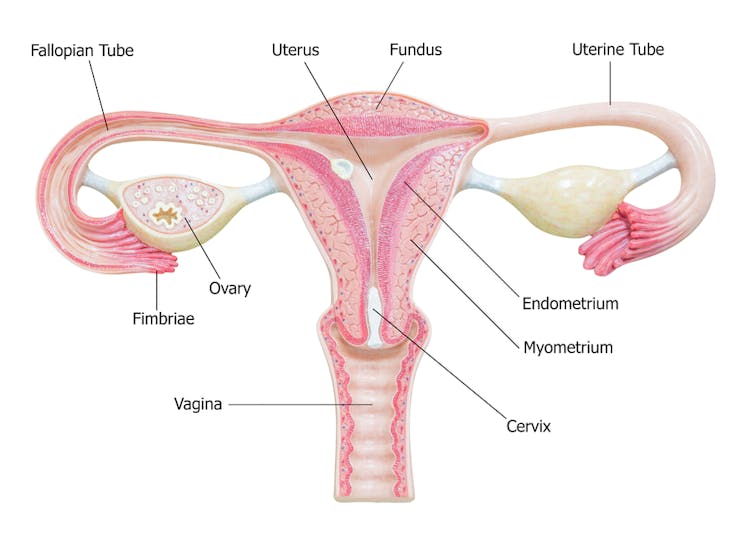The vagina is an internal organ that has a complex ecosystem, affected by the levels of circulating hormone that changes during the menstrual cycle, pregnancy, breastfeeding and menopause.
About menopause and after menopause, there are natural changes in the growth and function of vaginal cells, as well as microbium in the vagina (groups of bacteria that live in the vagina). Many women will not notice these changes. They do not usually cause symptoms or anxiety, but if they do so, symptoms can usually be managed.
Here is what happens to your talent as you get older, whether you notice or not.
Let’s remove terms
We focus on the vagina, the muscular tube that is transmitted from the external genitalia (vulva), after the cervix, to the uterus (uterus). Sometimes the word “vagina” is used to include external genitalia. However, these members are different and play different roles in women’s health.

What happens to the vagina with your age?
Like many other organs in the body, the vagina is sensitive to female hormones for females (hormones) that change around puberty, pregnancy and menopause.
Menopause is associated with a decrease in the concentrations of the traded estrogen hormone, and the hormone progesterone is no longer. The changes in hormones affect the vagina and its ecosystem. Antiquities It may include:
- Less vaginal secretions, which leads to dehydration
- Less growth of vaginal surface cells, which leads to a thin lining
- Change in the structure of support (connective tissue) around the vagina, which leads to less flexibility and more narrow
- Less number of blood vessels around the vagina, which may explain the blood flow less after menopause
- It turns in the type and balance of bacteria, which can change vaginal acidity, from more acidic to more alkaline.
10 methods that change the vagina after birth
What are the symptoms that I can expect?
Many women do not notice any annoying vaginal changes with age. There is also a few evidence that many of these changes cause vaginal symptoms. For example, there is no direct evidence that these changes cause vaginal infection or bleeding in women after menopause.
Some women notice vaginal dryness after menopause, which may be associated with less vaginal secretions. This may lead to pain and discomfort during sex. But it is not clear how much this drought due to menopause, as the number of younger women is also this. in One study47 % of women have been activated after menopause, as did about 20 % of women before menopause.
Other organs close to the vagina, such as bladder and urethra, are affected by changing hormone levels after menopause. Some women suffer from frequent urinary tract infections, which may cause pain (including pain along the body) and irritation. So their symptoms in reality do not come from the same vagina, but they relate to changes in the urinary tract.
Not everyone has the same experience


Women differ whether they have noticed vaginal changes and whether they have been bothering these somewhat before. For example, you may not notice women who suffer from vaginal dehydration that does not sexually change vaginal secretions after menopause. However, some women notice very drying that affects their function and daily stimulation.
In reality, Researchers worldwide They notice more menopause experiences to inform future research. This includes giving priority to the symptoms that interest you to women more than others, such as vaginal dryness, discomfort, irritation and pain during sex.
If the symptoms bother you
Symptoms such as dehydration, irritation or pain can usually be managed during sex. Lubricant may reduce pain during sex. Vaginal moisturizers may reduce dehydration. Both are available without a prescription in the local pharmacy.
While there are many small clinical experiences of individual products, these studies lack the ability to prove whether they are really effective in improving vaginal symptoms.
In contrast, there is strong evidence that vaginal estrogen is effective in treating vaginal dryness and reducing pain during sex. It also reduces your chance of frequent urinary tract infections. You can talk to your doctor about a prescription.
The vaginal estrogen hormone is usually inserted with a rod, two to three times a week. Very little is absorbed into the bloodstream, it’s so In general But long -term experiences are needed to confirm safety in the long term after a year.
Women with History of breast cancer We must see oncologist to discuss the use of estrogen because it may not be suitable for them.
Dr. Siyan Halei, from the health of women Victoria, contributed to this article.
This article of the conversation is republished under the Creative Community Licensing. Read the original article. Read more: What happens to your talent with your age or lose weight
How weight loss affects the vagina
Yes, this is true, you can lose weight from your vagina!
People often refer to the “toe”, in fact, a real name: Mons-Pubis and you can lose weight there.
Dr. Sherry Ross explains.“Loss of weight and weight gain can definitely change the appearance of your vagina, for the better or worse,” says Ross. Loss of weight will reduce the size and shape of the Monk and the external blades, which makes the vagina look better and healthier. “
And she explains that when it comes to a healthy mons (also known as how to get rid of this sentences), all of this relates to you BMI (BMI). If you are overweight, Monk is likely to stand out. If you drop the size of the dress, you will notice a difference in how your tight pants are suitable and you can move from Big Mac to the Burger Cheeshes as one lady and you described with joy.
Do not forget, however, a little pillow is important for Mons. It helps to protect your appetite from anger and injury during sex.
Read more: Yes, this is true, you can lose weight on the vagina


Are you ready to drop the size of the dress in 28 days?
Never go
Our program does not offer 1,200 calories restrictions
work out at home
Follow the training videos directed with expert fitness coaches (no equipment!)
You feel supported 24/7
In our own support sets with other mothers just like you!
Eat delicious and healthy food
With family -friendly weekly meal plans and more than 6000 easy recipes developed by nutritionists
There are no lock contracts, cancellation at any time.

